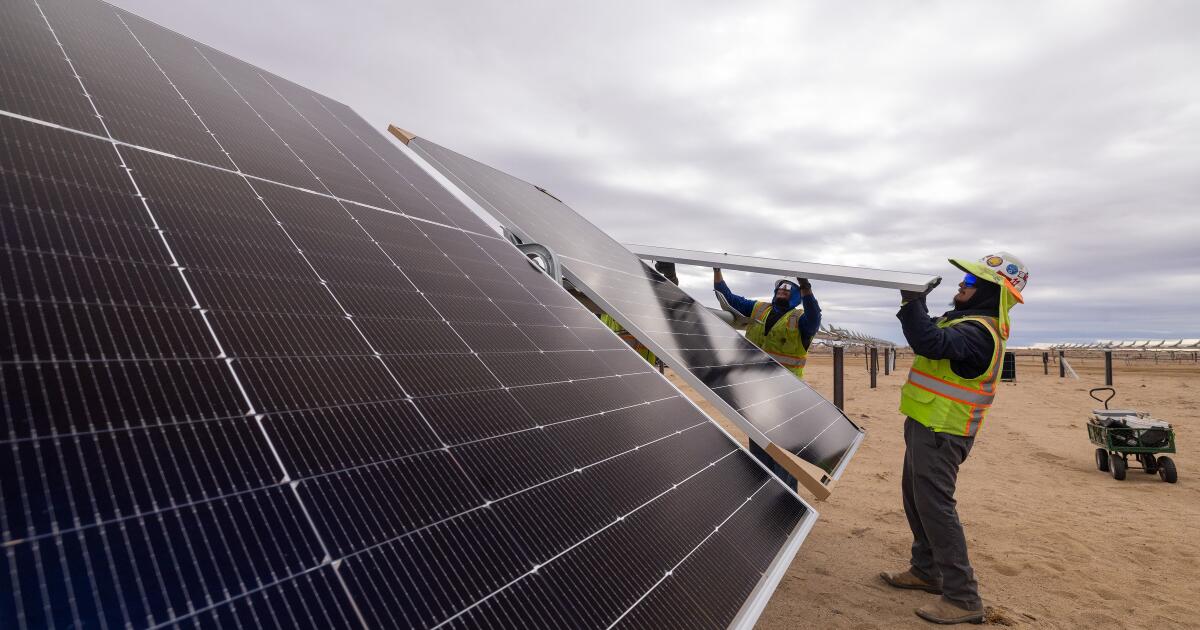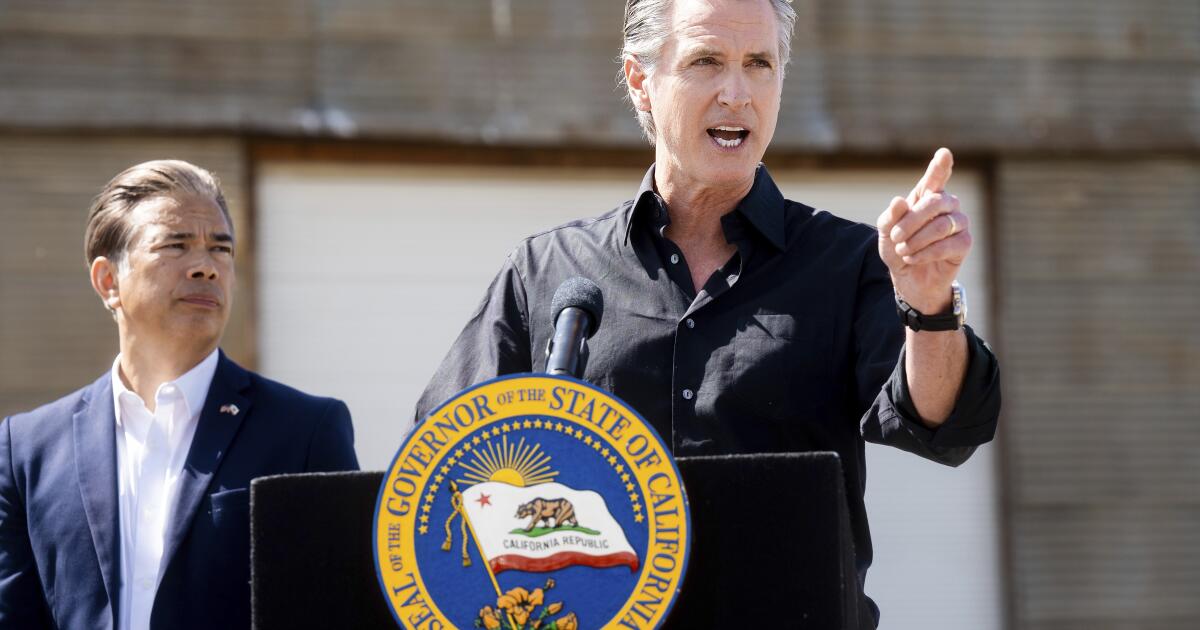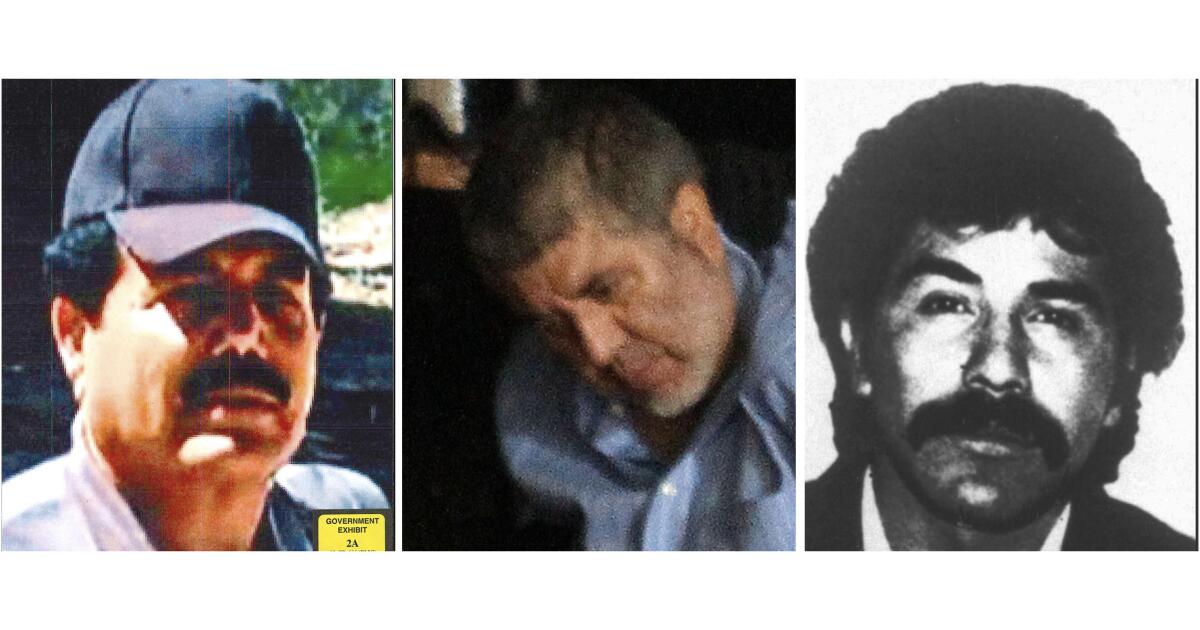Major clean power plant serving L.A. goes fully online in Kern County

MOJAVE, Calif. — One of the largest solar and battery power plants in the United States is now supplying Los Angeles and Glendale from Kern County.
Local leaders and clean energy experts gathered Tuesday beneath a blazing desert sun to mark the initiation of full production from 1.36 million solar panels and 172 lithium iron phosphate batteries that make up the Eland solar-plus-storage electricity project. It’s as large as 13 Dodger stadiums, parking lots included, and will generate 7% of the electricity for all of the city of Los Angeles, much of it at a record-low price.

The Los Angeles Department of Water and Power’s biggest solar and battery storage plant, the Eland Solar and Storage Center in the Mojave Desert of Kern County on Monday, Nov. 25, 2024 near California City, CA.
(Brian van der Brug / Los Angeles Times)
“This is the largest project for LADWP when it comes to solar and battery, and that is a huge accomplishment for us because it takes away the fear of doing more of these — and we need about 10 more of these to hit our goals,” said Janisse Quiñones, chief executive officer of the Los Angeles Department of Water and Power. The city has committed to 100% clean energy by 2035.
With Eland’s power now flowing through its grid, L.A. is nearly two-thirds of the way there: The project has pushed the city’s total supply to 64% clean energy, Quiñones said. Other sources of power in L.A.’s portfolio include hydrogen, natural gas, biomass, geothermal, nuclear and coal, which the city aims to decommission by the end of this year.
The $2 billion Eland project was developed by Arizona-based Arevon Energy and will also supply solar electricity to Glendale Water and Power.
While Eland’s sprawling solar panels are eye-catching, it’s the unassuming batteries — which look like rows of large white shipping containers — that are the real crux of the project.

Battery energy storage units at the Los Angeles Department of Water and Power’s biggest solar and battery storage plant, the Eland Solar and Storage Center in the Mojave Desert of Kern County on Monday, Nov. 25, 2024 near California City, CA.
(Brian van der Brug / Los Angeles Times)
Locating batteries together with solar power or wind allows them to charge up on the clean energy, then feed it back to people’s homes after the sun goes down or the wind stops blowing. At the end of 2023, there were close to 469 such “hybrid” clean power plants in the U.S., according to a recent report from Lawrence Berkeley National Laboratory.
In California, nearly every new solar project waiting to be connected to the electrical grid included batteries.
All scenarios for effectively addressing climate change call for using storage.
The Eland project is also coming online as the Trump administration is slowing the transition to clean energy with dozens of measures that favor electricity made from coal and natural gas. The president’s so-called Big Beautiful Bill ends federal tax credits for wind and solar within the next two years.
But in California and a number of other states where addressing climate change is mandated, the transition is likely to continue.
“I spent 12 years in D.C., and to be home, where this is not a controversy — there’s no controversy about climate goals and solar and renewables — it‘s an exciting day,” Los Angeles Mayor Karen Bass told The Times.
Eland “represents a significant milestone toward reaching our climate goals, and it also just reinforces our stature of leading the country in terms of renewables and moving toward clean energy goals,” Bass said.
Kevin Smith, chief executive officer of Arevon, said solar paired with battery storage is currently the cheapest source of energy “with or without tax credits,” and the fastest to deliver to market. The Eland project took about two years to complete once the first shovel was in the ground, compared with nuclear or natural gas projects that can take several years longer, he said.
Smith also cited the sudden increase in forecast need for electricity for data centers. “If we don’t meet that demand, that means the AI future is going to be won by the Chinese, because they’re building more solar in a month than we build in a couple of years.”
Two-thirds of all the renewable energy installed globally in 2024 was in China, which strongly encourages the buildout.
In the U.S. now, such projects must either begin construction by next July or be placed into service by the end of 2027 in order to receive a federal tax credit from.
But much of Eland’s success will depend on DWP, which has committed to a 25-year, $1.5 billion contract for its power, with options to buy the facility outright as soon as year 10, according to company officials.
Eland marks DWP’s first utility-scale integrated solar and battery project. Its two facilities combined — the first phase opened last year — will generate 758 megawatts of solar power and store up to 1,200 megawatt-hours of energy, all of which can be dispatched during peak demand in the evening or nighttime.
DWP officials said Eland is the lowest-cost project in their portfolio, with the cost of generation and storage averaging about 4 cents per kilowatt hour. The energy is expected to be neutral or even a cost savings for ratepayers, company officials said.

Workers install solar panels for the Los Angeles Department of Water and Power’s biggest solar and battery storage plant, the Eland Solar and Storage Center in the Mojave Desert of Kern County on Monday, Nov. 25, 2024 near California City, CA.
(Brian van der Brug / Los Angeles Times)
That’s partly because DWP was able to contract for the power prior to the COVID-19 pandemic and ensuing supply chain issues, and well before new market uncertainties related to tariffs, according to Quiñones.
Experts say such projects can’t come soon enough. Last year was Earth’s hottest on record, with rising global temperatures driven primarily by fossil fuel emissions. The Eland project alone is expected to avoid emissions equivalent to about 120,000 cars, according to company officials.
“When the City of Los Angeles first pursued renewable power some twenty years ago, it did so on moral grounds. It was ‘the right thing to do’ to reduce the City’s greenhouse gas emissions,” Jonathan Parfrey, executive director of the nonprofit Climate Resolve, said in a statement. “Flash forward to today — and solar power is now the right thing to do economically, producing electricity at a cost lower than that of coal, natural gas and nuclear power.”
About 75% of the state’s energy on Tuesday came from renewables, according to the California Independent System Operator.
With Eland, DWP is well on track to meet its 100% clean energy goal by 2035, although Quiñones said the last 3% to 4% will be the most challenging.
But a project like Eland — the largest DWP has ever done — “demonstrates our commitment toward our renewable and clean energy transition,” Quiñones said. “We’re not backing down from that.”





